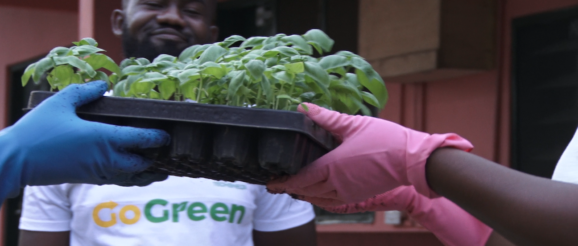Innovation in agric sector; upcycling Ghana’s food waste [Video]

One of the sectors that has performed well in this COVID-19 period is agriculture. Throughout the period of global uncertainty, Ghana was fortunate enough to have more than enough food to feed itself without experiencing any crises of food shortage.
With the increased consumption of food comes increased waste.
Unfortunately, the lack of appropriate channels to dispose of food waste has resulted in environmental pollution.
Each year, more than one million tons of agricultural waste is generated from farming in Ghana. But this does not have to be the case and innovators in the agricultural ecosystem are working to provide a viable alternative to the traditional methods of waste disposal.
Fibre Wealth is a company that processes coconut waste into coco peat.
Coco peat is a 100% organic growing medium which can be used alone to plant crops or mixed with soil.
Nana Yaa Ayebea, the administrator of Fibre Wealth, explains the inspiration behind recycling coconuts into coco peat to Citi Business News:
“We realized that we had coconut in abundance in Ghana that usually pollutes the environment. There is this notion that no part of the palm is thrown away, so we wanted to test the theory with coconut since they are in the same family. After extensive research, we realized that coconut could be transformed into coco peat which can be used as topsoil.”
At first glance, the coco peat looks very similar to palm chaff that most people in the village use to light fire in their coal pot but Nana explains that when it comes to using as a substitute to topsoil, the coco peat can be more powerful than soil.
“It does not have anything in it, so you get to control the exact amount of nutrients you want in it. For example, you determine if you want to give your plant 10% ammonia or 20% urea. You are able to control the growth of your plant and farm. This way, once you put in 100 seeds, you get 100 seedlings. This is very different from harvesting soil that could’ve been tampered with and contaminated. Because the coco peat originates above ground, it is free of soil diseases such as nematodes,” Nana said.
Beyond its ability to help farmers control the nutrients of their plant, the coco peat has lots of fibre that are beneficial to the growth of the plants.
Nana Yaa further explained why she believes coco peat is once again superior to soil.
“The fibre holds water and releases it gradually so you don’t have to water frequently. The difference between coco peat and soil is that soil sometimes has sand so water goes right through it and therefore the farmer has to spend more time watering.”
Moving from coconut waste to a broader pool of food waste, the Agrosourcing team promotes up-cycling of food waste by creating value from agricultural by products and waste that would have ordinarily gone to pollute the environment.
Richmond Zissu, the CEO of Agrosourcing, explains how this works: “We add value to agricultural residues. We have identified that there are various uses of agricultural residues, be it cocoa pods, palm kernel shells, coconut husk etc, they have endless possibilities for value addition. We’ve mapped out Ghana and researched where to find these residues. We have identified that there are players in the ecosystem who are already adding value to these residues. So we find the waste and add value to them.”
Agrosourcing also leverages technology to aggregate data on areas that produce excess agricultural waste and supply the value-added residue to individuals and organizations demanding the upcycled food waste.
Isaac Aseidu, the CTO of Agrosourcing elaborates why data collection is needed to sustain the upcycling of food waste.
“The prime asset is actually data. All our efforts of curtailing agricultural waste are hinged on data, making sure that we know exactly where productions are taking place. Once that data is collated, people who demand the upcycled product will have easy access to them.”
Although Ghana’s agricultural sector has a long way to go until it is able to meet its full potential, these innovators prove that there are limitless possibilities within the sector if we are willing to look critically at the value chain and see the challenges within it as business opportunities.
Click below to watch the full report:
